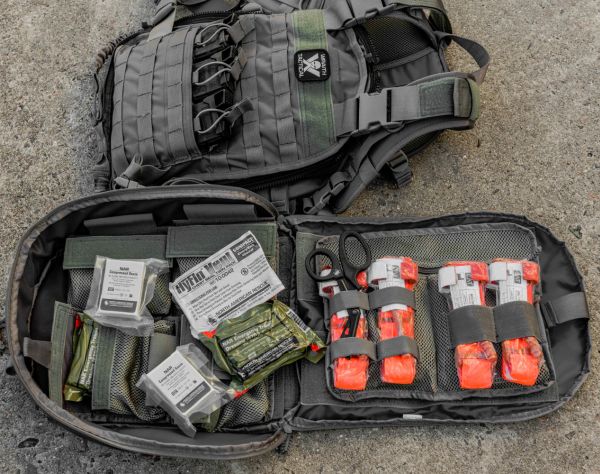|
A Top Priority for First Aid January 10, 2018 By Dave Young (YoungBuckDave) First aid and the skills needed to perform it are topics that are frequently ignored by most people. Whether you are a civilian or law enforcement officer, people tend to minimize the importance of this topic for a variety of reasons. Being able to provide basic medical skills to someone else, or even yourself, does not require you to be a doctor, Also, the skills gained by taking the time to learn some basic trauma care could save lives, including your own. This article will point out some specific skills and tools which I consider to be very important and do not require any type of medical degree. The most important factor in providing possible life saving assistance is getting CPR certified. All you need to attain a CPR certification is 3 hours of time and a computer. When I got CPR certified, I was required to seek out an instructor led class in person. Now you can attain this certification online from the comfort of your own home. After a few hours of an online class, you theoretically possess the skills to possibly save the life of someone who exhibits the symptoms of cardiac arrest. By administering CPR immediately, you can greatly increase the successful survival of the person until more advanced care arrives. Cardiac arrest is the sudden loss of blood resulting from the failure of the heart to pump effectively. Through the combination of chest compressions and/or rescue breathing you can help manually stimulate the heart to pump oxygen to the brain to preserve it until help arrives. Being able to effectively perform CPR is an easy skill to obtain and can greatly affect the outcome of a life-threatening situation.
The second medical skill and tool that is commonly overlooked, but is getting more attention, has to do with being able to effectively administer a tourniquet. Essentially, a tourniquet is a constricting or compressing device used to control arterial and venous blood flow to a portion of an extremity for a period of time. Tourniquets are small, compact and can be routinely and easily carried without restriction. Many civilians have started to carry tourniquets due to the unpredictability of the world in which we live. Some police officers carry one or two tourniquets while on duty to either give aid to themselves or someone else. Prior to using a tourniquet on someone, you should always try to stop the bleeding by applying direct external pressure to the wound to slow the bleeding. If the bleeding continues heavily, only then should you apply a tourniquet. Tourniquets have been used in many situations ranging from combat to car accidents. Knowing the proper skills and circumstances of how to use, and when to use, a tourniquet can make the difference between life and death for a person who has lost large amounts of blood and runs the risk of falling into shock or dying. All you need to attain this skill is minimal instruction from a professional who is experienced in using a tourniquet, and then the small amount of money it takes to purchase one. The last medical skill that is often overlooked, but can be attained by anyone, has to do with basic first aid. All people can benefit from this skill set. Whether you are a parent with kids, a police officer in the field, or just an average civilian looking to have the skills to assist in an emergency, the training in basic first aid can mean the difference between life or death. Unfortunately, not every trauma situation can be solved with Neosporin and a band aid. Having the skills to be able to stop or slow down the flow of vigorous bleeding can greatly increase the chances of a positive outcome from a negative situation. Along with gaining the skills of wound care, a person will learn how to assess the scene of the incident which ensures their own safety and the safety of others, how to make a basic assessment of the patient, how to safely move the patient, what equipment should be used to ensure their own protection against any bloodborne pathogens, and much more. The skills gained from a basic first aid course are practical and can be applied by anyone throughout their life. All it takes is a little time and commitment along with a well-stocked First Aid Kit in your home, vehicle and work place. I understand that some people feel inadequate regarding medical knowledge and therefore just rely on medical professionals, like paramedics and EMT's. As a result, they do not feel the need to seek any kind of medical training on their own. My own personal experience has taught me that a lot can go wrong in a very short amount of time if you need to help yourself or someone else in a medical emergency, whether it be a car accident, heart attack, or a wide variety of trauma situations. All it takes to alleviate this is a small amount of time used to seek out some basic medical training that could greatly affect the outcome in a life or death situation. This knowledge will enable you to always be prepared. |
